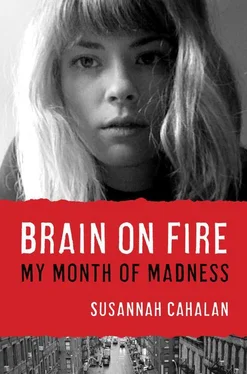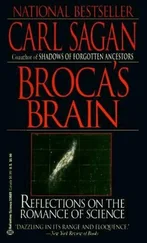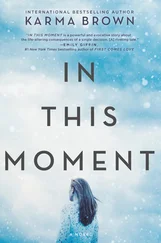Stephen joined me up on the steps, took me in his arms, and twirled me around, as we laughed at how silly we looked. My father and Giselle joined hands and slow-danced to the upbeat song.
The brain is radically resilient; it can create new neurons and make new connections through cortical remapping, a process called neurogenesis. Our minds have the incredible capacity to both alter the strength of connections among neurons, essentially rewiring them, and create entirely new pathways. (It makes a computer, which cannot create new hardware when its system crashes, seem fixed and helpless.) This amazing malleability is called neuroplasticity. Like daffodils in the early days of spring, my neurons were resprouting receptors as the winter of the illness ebbed.
It was during that dreaded third hospital stay that my true moment of awakening occurred; I began keeping a diary, started reading again, and first expressed the desire to understand what had happened to me. Perhaps because the diary provides physical evidence of my budding self (I can literally read the thoughts of that wounded Susannah), I can in essence begin to remember what it was like to be her, unlike the earlier Susannah from those paranoid diary entries before the hospital, who was more like a figment of a shadowy memory, so distant that she might have been a character in a horror movie. Yet the person I read about in my recovery diary is childlike and prosaic, unlike that umbral pre-hospital self who could, even at her most obscured, be eerily illuminating. Yet, there are surprising similarities between this diary and the journals I kept during junior high school. In each, there’s a stunning lack of insight and curiosity about myself. In place of deep thought, there are dozens of passages dedicated to my body (weight gain in the recovery piece and lack of breasts in the junior high journal) and silly, petty issues of the day (hating hospital food versus fighting with frenemies). I sympathize with this vulnerable, budding Susannah, as I do that preteen version of myself, but she is still not entirely me, as I am now.
I wrote my first entry at the hospital, dated June 3, 2009, while I was receiving the second IVIG infusion. My father, who had stayed with me every morning as usual during that third hospital stay, helped me write, suggesting that I try to retrace my lost time by compiling a chronology of events from my own memory. My list began with “numbness and sleepiness” and ended with “seizure 3 in the hospital.” I had nothing to record after I had bought that cappuccino in the admitting area of the hospital on March 23. In making the list I had also gone back and crammed the words “night at Dad’s house” in between “seizure 2” and “seizure 3,” almost as an afterthought. This line is the least legible, and with good reason: I was still uncertain and ashamed of my behavior that toxic night (as I am to this day), and it showed even in my handwriting.
My writing was still unfamiliar, but it was a far cry from the infantile notes I had made during my first hospital stay. I could now write in full sentences and even use a semicolon. But what is most telling about my list is the absence: there are no memories at all from my time in the hospital.
My father looked over the page with alarm. It was the first confirmation of my profound memory loss. But he hid his surprise and helped me add in some pieces from his own recollection, providing a more fleshed-out version of events. However, there are still clear omissions, which were both my father’s and mine. The gaps are minor but telling, since memory loss can occur not only in brain injury but also with emotional trauma. No one close to me during this time had been spared.
My father indulged in this chronology entirely for my benefit, because he despised speaking of that time. His new motto had become: “To move forward, you have to leave the past behind.” But Giselle would later tell me privately how hard the situation had been on him. He was a wreck. When other family members called for updates, he’d wave away the phone, certain that he would lose his hard-won composure once he heard familiar voices. My brother remembers speaking to our dad over the phone while he was still in school and I was still in the grips of a mysterious illness. At one point in the conversation the only sound James could hear on the other line were deep gulps of air meant to mask the sounds of heavy sobs.
Then there is the private journal, which my father, in lieu of talking directly to me about what happened, decided to hand over to me for my research. These entries allowed me to relive the hospital stay from my father’s perspective. I read and reread every line; there were moments of laughter and solemn times, and then there were passages so heartwrenching that I wanted to race over to him in Brooklyn and give him a bear hug. But I knew better than to do that. “To move forward, you have to leave the past behind.” Though I wasn’t ready to do that myself, I could, at least for his sake, follow his motto when it related to him. My strong Irish protector was, at the heart of it all, a big softie, and his love for me, something that during our roughest times I had questioned, was immeasurable. “All I knew was that she was alive, and her spirit was intact. We had more hospital stays for treatments, doctor visits, and lots of medications to deal with, but my baby was on the way home,” the journal ends.
Though I never properly thanked my father (or, for that matter my mom, Stephen, my friends, or even the doctors and nurses), we now met for dinner regularly, which was a vast improvement over the once-every–six months relationship we had had before. Sometimes, now, over a meal, we lock eyes and begin speaking in some sort of secret code, which could be described as an otherworldly connection, inadvertently freezing out everyone else at the table. I never realized how rude we often were until Giselle later brought it up. “I don’t think you guys are aware of it,” she confided, “but sometimes it’s hard for people around you to feel included.”
We didn’t mean to exclude others. My dad and I had gone off to war, fought in the trenches, and against all odds had come out of it alive and intact. There are few other experiences that can bring two people closer than staring death in the face.
. . .
By contrast with my newfound connection with my dad, ever since I was released from the hospital, there had been the cloud of the pills and everything else hanging over my mother and me. I think it’s precisely because of how close my mother and I had been prior to my illness that our relationship suffered. Perhaps because my dad had been more of a footnote in my life, whereas my mom was a dominant force, it was easier for my father to engage with this “new” me.
To cope, my mom actively rewrote the narrative of my disease, insisting that I was “never really that bad” and that she “always knew I would recover.” I was too strong to be sick forever, she told herself. She couldn’t come to terms with the fact that I wasn’t yet fully recovered until one afternoon in midsummer when we went out to eat, just the two of us, at J. B. Winberie’s in Summit. It was a magnificent evening, with a slight breeze rustling the umbrellas above the patio furniture, so we took seats outdoors and ordered fish entrees and a glass of white wine each.
As we ate, I began to ask her questions about how I had behaved during those days in Summit before I was admitted to the hospital. I still had only nebulous recollections, mostly of things that had turned out to be hallucinations, and I wasn’t sure what was real or not. The whole thing was still a mystery to me, and I was eager to piece together what had happened.
Читать дальше












